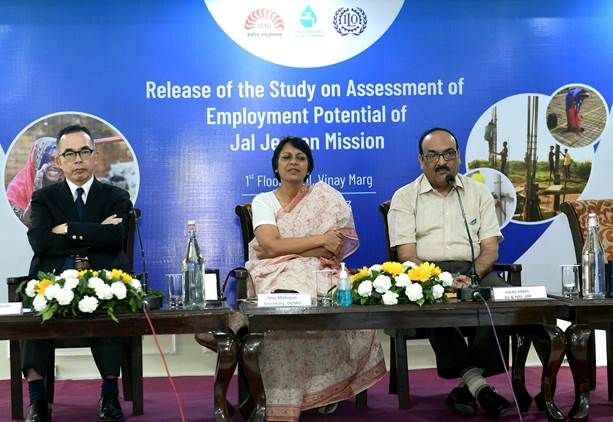IIM Bangalore Study Assesses 2.82 Crore Person-Year Employment Generation Potential Of Jal Jeevan Mission
As envisioned by Prime Minister, Shri Narendra Modi, the Jal Jeevan Mission is benefitting people in numerous ways including improvement in health and employment opportunities. In a study undertaken by IIM-Bangalore with technical support from the International Labour Organization (ILO), a detailed analysis of direct and indirect employment creation potential under the Jal Jeevan Mission (JJM) has been carried out. The report of the study, which was released here today, has estimated an immense employment generation potential of JJM to the tune of 2.82 crore person-year employment.
The estimated generation of 2.82 crore person-year employment includes 59.93 lakh person-year of direct employment during the construction phase of JJM and an additional 2.22 crore person-year of indirect employment in the country through manpower engaged in production of the materials such as pipes, valves, pumps etc. Almost 40% of the direct employment created is i.e., 23.8 lakh person-year, is estimated to be on account of engagement of engineers, managers, plumbers, electricians, motor mechanics and chemists etc. Additionally, 11.84 lakh person-years of direct employment has been estimated during the Operations & Maintenance (O&M) phase every year.
The report on ‘Assessment of Employment Potential of Jal Jeevan Mission’ by Centre for Public Policy under IIIM-B provides keen insights on the employment generation potentials of JJM at various stages of its implementation, including aspects such as direct employment via construction, allied employment like transportation and long-term engagement for operation & maintenance of piped water supply systems and assets being created in the country under the flagship initiative of Jal Jeevan Mission in the country.
The investment being made under the mission is resulting in creation of public assets, leading to direct, indirect, and induced effects on employment. The direct impact includes the employment generated during the construction and O&M phases of an infrastructure project, while indirect employment is generated during the production, storage, and transportation stages of materials used in the construction as well as O&M stages and in the production of inputs used in those materials. Induced employment would also be generated post the provision of the public infrastructure, due to the benefits of using the infrastructure.
Both macro and micro approaches were adopted in the study to understand the implications of the investment on employment across industries as well as states. In the macro approach, input-output model has been used to estimate the impact of the investment on employment across industries while in the micro approach, sample data collected of completed JJM schemes from different states were used to estimate direct employment at the time of construction and O&M phases of the projects.
Jal Jeevan Mission, announced in August 2019 by the Prime Minister, aims to provide tap water connection to all rural households. The Mission focuses on drinking water service delivery, to ensure supplies with sufficient quantity, prescribed quality and on regular and long term basis. The Mission is being implemented at an unprecedented speed and scale. Within a short span of just 4 years, the coverage of tap water has increased from 3.23 crore (17%) households at the time of launch of the Mission in 2019, to more than 12.77 crore (65.81%) households. During the same period, the issues of access to clean drinking water in Arsenic and Fluoride affected areas have also been fully addressed.
This is the third in a series of findings released recently, on the impact of JJM on the lives of citizens in rural India. Nobel laureate Prof. Michael Kemer recently published his findings suggesting that availability of safe drinking water has the potential to avert 1.36 lakh child deaths (below 5 years) in the country leading to almost 1/3rd reduction in child mortality rates. WHO to recently published in findings on the impact of JJM on public health, wherein it is estimated that with 100% coverage of tap water supplies, more than 4 lakh diarrheal deaths can be averted translating in economic savings of more than 8 lakh crore on account of 14 million DALYs (Disability Adjusted Life Years) averted thereby. The WHO also estimates that with 100% coverage of tap water, more than 6.6 crore hours of time shall be saved for people every day, predominantly for women, which they otherwise would have had to spend in collection of water for daily needs for water.
In line with the vision of the Prime Minister to improve the ease of living for the people of India, the Jal Jeevan Mission is benefitting people in numerous ways. It is not only changing the way of life in rural India with provision of tap water at household level, but also leading to spin off benefits in terms of better health & more economic opportunities for people, especially for women. Signification generation of employment under JJM is providing further impetus to economic growth.

